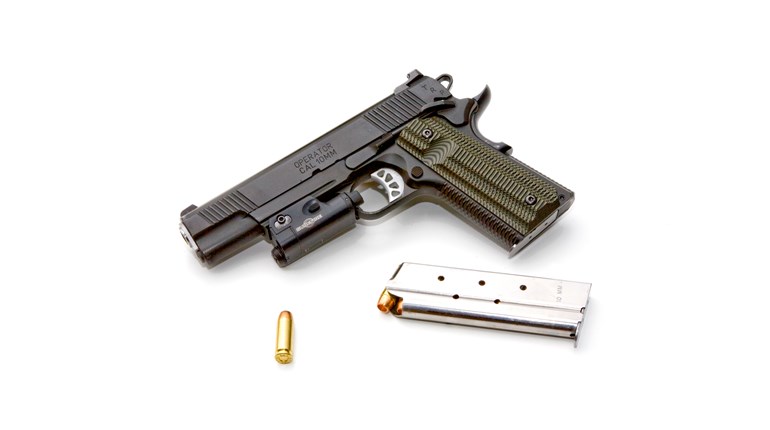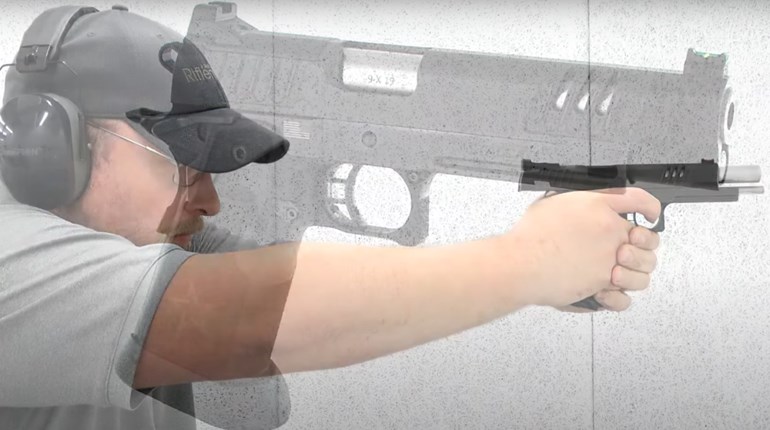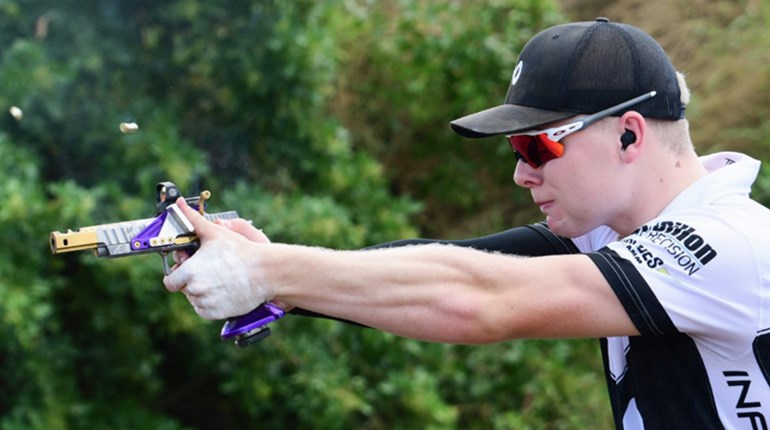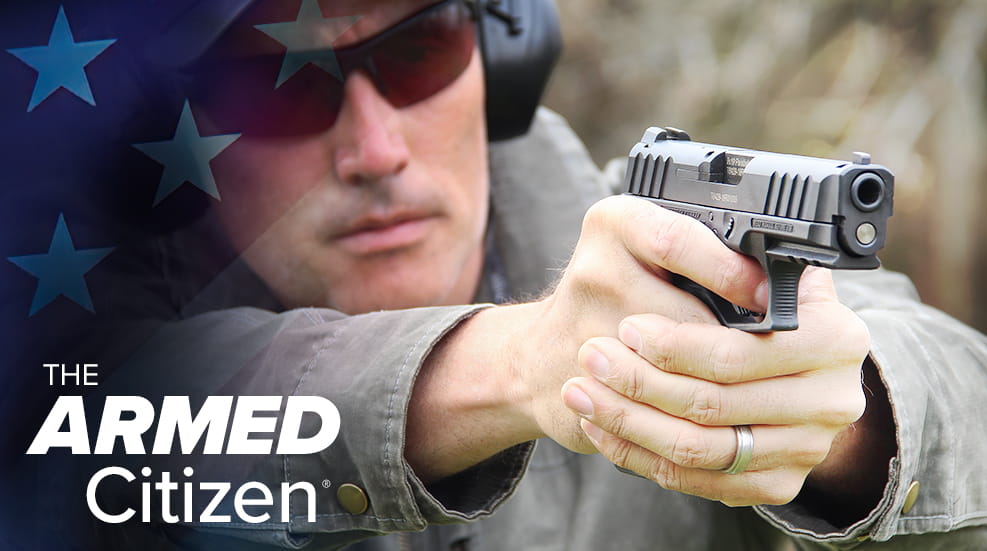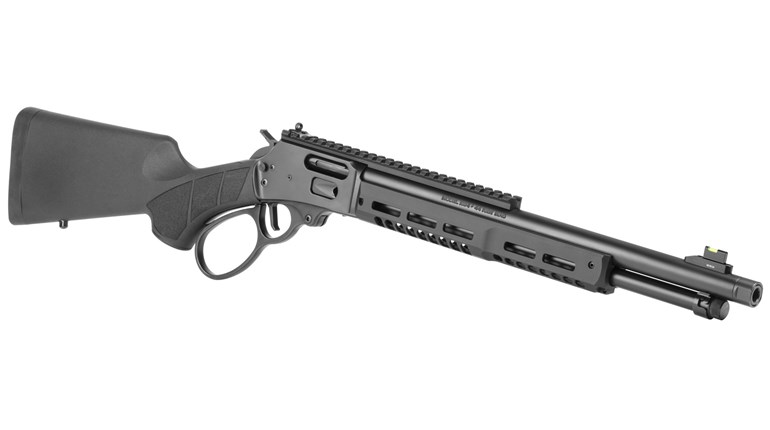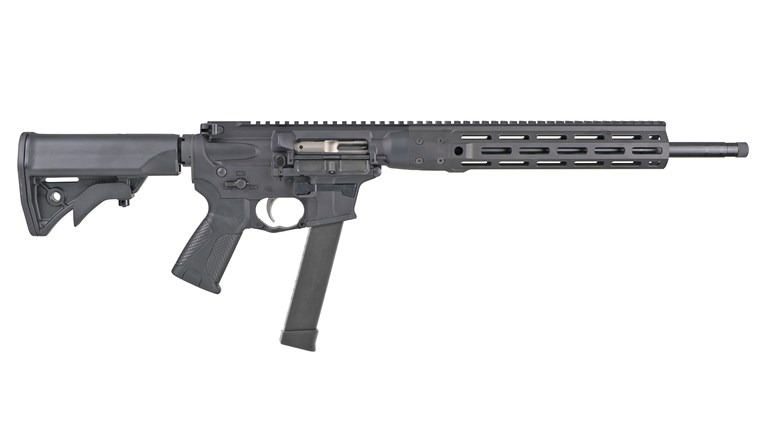
This feature appears in the October ‘17 issue of NRA America’s 1st Freedom, one of the official journals of the National Rifle Association.
It isn’t always a good sign when the box alone for something looks like it would cost a couple hundred dollars. Marketers get paid big money for the whole “lipstick on a pig” thing, after all, and few of us reach adulthood without getting sucked into a tight turn or two by slick packaging.

But just about the time you realize the understated logo bespeaks Georgetown, Texas’, STI International, a whole new meaning for caveat emptor—buyer beware—comes to mind: Beware opening this box, because whatever is inside, you’ll want. And so it is with STI’s 2011 Costa Carry Comp.
A good deal can be understood just from the 2011 portion of the name: A superlative double-stack 9 mm handgun on John Browning’s pattern, but lightened/strengthened/optimized at nearly every turn. Grand trigger? It’s 3.4 pounds, with ambidextrous safety, naturally. Classic grip angle? Certainly, but enhanced with TreeBark stippling and double undercut trigger guard, all of which sit above a magazine well that looks as though a smallish bus would fit inside, to say nothing of up to 21 rounds of 9 mm with the available 140 mm magazines (or 13 rounds of
.45 ACP for you big-bore diehards).
If someone offered up “thrilling” as a first descriptor, they’d get no argument here.
Given that the design is the result of STI’s state-of-the-art reputation and collaboration with combat pistol guru Chris Costa, such enthusiasm is deserved. A tri-topped slide with forward and rear cocking serrations is nestled precisely behind a matching contour, one-chamber comp, and fairly begs to be cycled—by any means. Cycling by hand reveals both welcome ease and a crafty bit of engineering and machining: The comp, barrel and sight “island” are all one piece (if you’ve ever shot a comp loose—or off—you won’t wonder why this is to be admired).
Cycling by ballistic means was the (urgent) next step. In classic “you get what you pay for” terms, the Costa delivers flat-shooting precision with a predictable side effect—overindulgence. Between the match-ready trigger and precise fiber front sights, everybody who tried marched quality hits out to non-trivial distances (50-yard “A”s were commonplace on USPSA metric targets). Speed work was less dignified, but just as successful, producing literal giggling from supposed tough-guy and -girl operators alike.
A final attribute strikes us from our look at the CCC, and that is the present state of the finish. Nobody would be surprised that photography generally precedes the calculated abuse of a review, and so it did for the STI. It is noteworthy, though, because that expedient was unneeded. Some 800 rounds and considerable holstering have left the Diamond Like Carbon finish completely unmarked, even on what would normally be wear surfaces.

STI took the pains and did the research to get the finish—and a host of other things—as close to perfect as we can tell. Inside and out, the Costa Carry Comp is a pistol-of-a-lifetime sort of firearm, and very much worthy of that fancy box, too.
Nuts and Bolts:
Versatility – High-end compensated handguns carry some baggage, especially for those who’ve watched them run in competition. Famously fast, but just as famously fussy, they bring all the nuances and capabilities of “top-fuel” dragsters to handgunning. The Costa Carry Comp (CCC) risks some entanglement here. As a compensated gun, it can run—if your state permits—with those same big stick magazines that simultaneously charm (with large capacities) and bedevil (with incomprehensible malfunctions) the no-reloads crowd.
We could find no trace of the latter delicacy in the Carry Comp. Factory fodder from 115s to 147s ran with no hint of difficulty, even in the first 200 or so rounds that we often “spot” to Browning-pattern pistols for wear in. It’s as near to out-of-the-box ready as can be imagined. As our tests progressed, we eschewed even periodic cleaning, and our now-filthy sample continues on its error-free way.
To find something that wouldn’t run, we resorted to the reloading bench. At the top end of both the power and bullet weight spectrums, we reached safety limits before the Costa reached apparent performance limits. At the lower end (bullets as light as 100 grains), it’s easy to render toy-like in terms of soft shooting, while still running like the proverbial clock. Reliable slide lock on an empty magazine was the only casualty.
Comps And Carry – Recoil-reducing technologies like the comp on the Costa are derided by some defensive gurus as inappropriate for carry guns. Nor are their objections wholly unreasonable: Dark-adapted vision for some is compromised by bright venting gases, and certain close-quarters engagements risk bringing those recoil-chopping, hot gases close to the face and eyes. There’s no substitute for testing this cautiously for yourself, but we’d put it this way: None of these considerations would keep us from cheerfully carrying the STI if our kit and attire allowed for an essentially full-sized pistol in the role.
Grip Gripes - 1911 shooters are likely to take to the 2011 grip profile with ease, despite its larger dimensions. Whether or not one subscribes to the “corner theory” that has always made 1911s feel disproportionately secure is rendered moot by the TreeBark stippling. Undercutting of the trigger guard for both strong- and weak-hand fingers also adds solidity disproportionate to the small dimensions of these reliefs.
We tried only “wet” handling (not Chuck Taylor’s motor oil), but this compromise simply wasn’t one; we’d label it immaterial, in point of fact. A fellow shooter with a seriously compromising skin state on her palms gave it a go at our behest, and her commentary may be the most revealing of all: “Best ever, good hands or bad.” It’s very grippy, in other words, just not punitively so.

But what might be a problem for some shooters should not be confused with a flaw, though it’s a much-debated one—the grip safety. If you’re coming to the Costa from a striker gun, you may find the desirable high-and-deep grip that aligns the bore axis with the bones of the forearm actually reactivates the grip safety by putting up-pressure on the STI’s ample beavertail. This requires a clumsy downward re-grip after the draw/presentation, and is a slow, error-prone (here, read “drop risk”) proposition.
Naturally, you can train around this, but there’s a modest gear fix that works too, and much more quickly: Cant your holster rearward. The goal is a slightly muzzle-forward attitude that puts the grip of the Costa—or any other similar design—more nearly horizontal. Straight up and down holsters rotate the wrist and elbow forward in the draw stroke, and this is what sabotages proper safety activation and makes the agonizingly slow re-grip necessary.
You’ll want to train consistently to realize the Costa Carry Comp’s vast potential in your own hands, no matter how you sport it; just make sure your holster isn’t holding you back. The STI certainly won’t.
Frank Winn has been studying arms and their relationship to tyranny, meaningful liberty and personal security all his adult life. He has been a firearms safety/shooting instructor for more than 20 years, and earned state, regional and national titles in several competitive disciplines.











